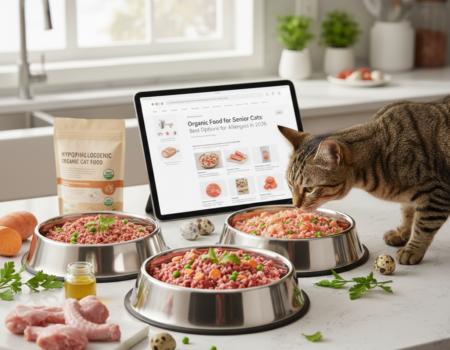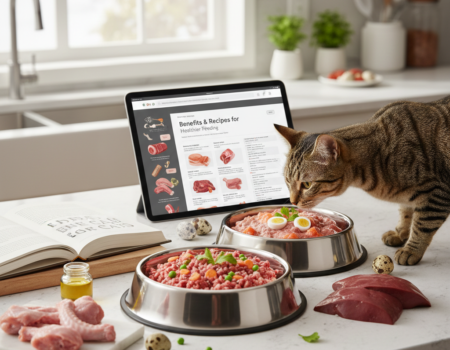If your cat is experiencing symptoms such as bloating, diarrhea, or vomiting, it may be time to evaluate their diet. Cats have unique nutritional needs as true carnivores and are not equipped to digest plants and vegetables. Additionally, cats in the wild get a significant amount of their water intake from their prey, so feeding them a diet solely consisting of dry food can lead to dehydration and other health issues. Sensitivity to additives can also contribute to gastrointestinal issues. To address a sensitive stomach, it is recommended to seek veterinary advice, remove filler products from the cat’s diet, replace processed food with moist, high animal protein, and low carbohydrate options, and ensure access to clean, fresh drinking water at all times.
Key Takeaways:
- Is your cat showing signs of a sensitive stomach? It’s essential to evaluate their diet and make necessary changes.
- Cats are true carnivores, and a diet based on moist, high animal protein options is ideal for their sensitive stomachs.
- Transitioning to a new cat food should be done gradually to minimize digestive upset.
- Choosing cat food formulated specifically for sensitive stomachs can help alleviate gastrointestinal issues.
- Proper hydration and maintaining a healthy digestive system are vital for cats with sensitive stomachs.
Understanding IBS and IBD in Cats
Cats can develop irritable bowel syndrome (IBS) which causes uncomfortable symptoms such as abdominal pain, bloating, diarrhea, nausea, and vomiting. If left untreated, IBS can progress to inflammatory bowel disease (IBD), which is chronic inflammation of the stomach or intestines. IBD is the leading cause of gastrointestinal issues in cats and can impact their ability to absorb nutrients from their food. While the exact cause of IBD is unknown, sensitivity to additives like artificial colors, flavors, and preservatives can play a role.
“IBS can cause symptoms such as abdominal pain, bloating, diarrhea, nausea, and vomiting in cats.”
When a cat develops IBS, it means their gastrointestinal system is reacting abnormally, causing discomfort and digestive issues. This condition can lead to inflammation and damage to the lining of the stomach and intestines. If the inflammation persists, it can progress to IBD, a more serious and chronic condition.
IBS and IBD can vary in severity from cat to cat, with some experiencing mild symptoms and others developing severe digestive complications. Cats with IBD may struggle to absorb essential nutrients from their food, leading to weight loss, malnutrition, and overall poor health.
Causes of IBD in Cats
The exact cause of IBD in cats remains unknown, but several factors can contribute to its development. Sensitivity to dietary substances, parasites, bacterial infections, and genetic predisposition are some of the potential causes.
Artificial colors, flavors, and preservatives commonly found in commercial cat foods can trigger inflammation and exacerbate existing digestive issues in cats with IBD. Other potential triggers include food allergies or intolerances to specific ingredients.
Distinguishing Between IBS and IBD
Determining whether a cat has IBS or IBD requires a thorough examination by a veterinarian. Blood tests, stool analysis, abdominal ultrasounds, and sometimes endoscopic biopsies are performed to reach a diagnosis. These diagnostic procedures help rule out other potential conditions and provide insights into the cat’s specific gastrointestinal issues.
Once diagnosed, treatment for IBS and IBD in cats typically involves dietary modifications, medications to manage inflammation and discomfort, and ongoing monitoring by a veterinarian.
Management and Support for Cats with IBS/IBD
A comprehensive treatment plan for cats with IBS or IBD aims to reduce inflammation, alleviate symptoms, and support overall gastrointestinal health. This often involves:
- Switching to a high-quality, hypoallergenic cat food that eliminates common food allergens and irritants
- Feeding smaller, more frequent meals to reduce the workload on the digestive system
- Adding probiotics or digestive enzymes to promote a healthy gut microbiome
- Minimizing stressors and providing a calm environment for the cat
Regular check-ups with a veterinarian and close monitoring of the cat’s symptoms are essential to ensure appropriate management. With proper care, cats with IBS or IBD can lead comfortable lives and enjoy improved gastrointestinal health.
Signs of a Sensitive Stomach in Cats
If you’re a cat parent, you may already know that cats are notorious for being private about their bathroom habits. However, if you observe signs such as vomiting, bloating, or diarrhea in your furry friend, it could be indicative of a sensitive stomach.
Similar to humans, cats can experience gastrointestinal issues that can cause discomfort and distress. These signs may be your cat’s way of communicating that something is off with their digestive system. While occasional stomach upsets are relatively common, persistent symptoms should not be ignored.
If you notice any of the following signs, it is advisable to consult a trusted veterinarian to rule out any underlying health problems and properly diagnose the issue:
- Vomiting: If your cat frequently regurgitates undigested food or experiences episodes of uncontrollable vomiting, it could be an indication of a sensitive stomach.
- Bloating: Excessive gas and bloating can occur in cats with sensitive stomachs, leading to discomfort and a distended abdomen.
- Diarrhea: Loose, watery stools or increased frequency of bowel movements can be signs of a sensitive stomach in cats. It is important to monitor the consistency and frequency of your cat’s stools for any changes.
Remember, each cat is unique, and these symptoms may vary in severity. If you suspect that your cat has a sensitive stomach, it is crucial to seek professional veterinary advice for an accurate diagnosis and appropriate treatment plan.
“If you notice signs such as vomiting, bloating, or diarrhea, it may indicate a sensitive stomach in your cat.”
The Ideal Diet for Cats with Sensitive Stomachs
When it comes to addressing the dietary needs of cats with sensitive stomachs, it’s important to provide them with an ideal diet that closely mimics their natural prey diet. Feeding them a diet that replicates the whole prey diet of meat, organs, bone, and seafood can significantly improve their digestive health.
One suitable option is the ZIWI Peak® diet, which offers both air-dried and canned recipes. These recipes are specifically designed to provide high-quality nutrition while catering to the unique needs of cats with sensitive stomachs.
The ZIWI Peak® diet replicates the natural whole prey diet of cats, providing them with the necessary moisture and high animal protein content they require. This diet is made from premium ingredients, ensuring that your cat receives optimal nutrition.
For cats with sensitive stomachs, ensuring proper hydration is crucial. ZIWI Peak® canned food contains an impressive 77.5% moisture, contributing to the cat’s overall hydration and aiding in digestion. This high moisture content helps prevent dehydration, a common issue in cats that consume primarily dry food.
Benefits of the ZIWI Peak® diet for cats with sensitive stomachs:
- Replicates the natural prey diet of cats
- High in animal protein, low in carbohydrates
- Contains essential nutrients and minerals
- Packed with moisture for proper hydration
- Avoids common allergens and artificial additives
| Brand | Type | Moisture Content | Protein Content | Carbohydrate Content |
|---|---|---|---|---|
| ZIWI Peak® | Air-dried | 15% | 35% | 10% |
| ZIWI Peak® | Canned | 77.5% | 8% | 1.5% |
The table above showcases the moisture content, protein content, and carbohydrate content of ZIWI Peak® air-dried and canned recipes. These numbers highlight the diets’ suitability for cats with sensitive stomachs, providing them with the ideal balance of nutrients.
By choosing the ZIWI Peak® diet, you can ensure that your cat receives the necessary nutrition while addressing their sensitive stomach. This diet promotes digestive health, provides essential moisture, and supports overall well-being.
Best Cat Food Options for Sensitive Stomachs
When it comes to choosing the best cat food for sensitive stomachs, there are several options that prioritize your feline friend’s digestive health. These top cat food brands have received positive reviews and are specially formulated to be gentle on sensitive stomachs:
- Blue Buffalo Sensitive Stomach Cat Food: Made with high-quality ingredients, this cat food is designed to support a healthy digestion system and promote overall well-being.
- Instinct Limited Ingredient Diet Dry Cat Food: This limited ingredient formula uses high-quality proteins and carefully selected ingredients to provide a balanced diet for cats with sensitive stomachs.
- BLUE Basics Limited Ingredient Diet Wet Cat Food: With a limited number of ingredients, this wet cat food is easily digestible and suitable for cats with food sensitivities.
- Merrick Limited Ingredient Diet Wet Cat Food: This wet cat food is made with a single source of animal protein, making it suitable for cats with sensitive stomachs or allergies.
- Instinct Limited Ingredient Diet Natural Wet Cat Food: This natural wet cat food features a limited number of ingredients and avoids common allergens, providing a gentle option for cats with sensitive stomachs.
These cat food options have been praised for their quality, effectiveness, and positive impact on cats with sensitive stomachs. Make sure to consult with your veterinarian to determine the best choice for your feline companion.
Remember, providing the right cat food for sensitive stomachs is an important step in maintaining your cat’s overall health and well-being.
Tips for Transitioning to Sensitive Stomach Cat Food
Transitioning your cat to a new sensitive stomach cat food requires a gradual approach to minimize digestive upset. Follow these tips to ensure a successful switch:
- Start by mixing a small amount of the new food with your cat’s current food. This allows your cat to become familiar with the new taste and texture.
- Over a period of about 7-10 days, gradually increase the proportion of the new food while decreasing the amount of the old food. This slow transition helps your cat’s digestive system adjust to the change.
- Monitor your cat’s response to the new food during the transition period. Look for any signs of discomfort, such as vomiting or diarrhea.
- If your cat experiences digestive upset, consider extending the transition period or adjusting the proportions of new and old food. Every cat is unique, so it’s important to find a transition plan that works best for your furry friend.
Remember, a gradual diet change is key when introducing new cat food for sensitive stomachs. By taking the time to transition slowly, you can help minimize any potential digestive issues and ensure a smooth switch to the new diet.
Expert Tip:
“When transitioning your cat to a new sensitive stomach cat food, be patient and observant. Slowly introducing the new food allows your cat’s digestive system to adapt and reduces the risk of gastrointestinal upset. Take cues from your cat’s response and adjust the transition period as needed.”
Other Considerations for Cats with Sensitive Stomachs
In addition to choosing a cat food specifically formulated for sensitive stomachs, there are other important factors to consider when it comes to the dietary needs of cats with digestive issues. These considerations include:
- Hypoallergenic Cat Food for Sensitive Stomachs: Cats with sensitive stomachs may benefit from hypoallergenic cat food. Hypoallergenic cat food is formulated with limited ingredients and avoids common allergens such as grains, dairy, and certain proteins. This type of cat food can help reduce the likelihood of triggering adverse reactions in cats with food sensitivities.
- Natural Cat Food for Sensitive Stomachs: Natural cat food without artificial additives can be a good choice for cats with sensitive stomachs. These types of cat food are typically made with high-quality, whole food ingredients and do not contain artificial colors, flavors, or preservatives. Natural cat food can provide the necessary nutrition without aggravating digestive issues.
- Premium Cat Food for Sensitive Stomachs: Opting for premium cat food made with high-quality ingredients can be beneficial for cats with sensitive stomachs. Premium cat food brands often prioritize the sourcing of their ingredients and undergo rigorous quality control measures to ensure the highest standards of nutrition. These cat foods are designed to provide balanced nutrition while promoting digestive health.
By considering these additional factors and choosing hypoallergenic, natural, and premium cat food options, you can provide your cat with the best possible diet to support their sensitive stomach and overall well-being.
Pros and Cons of Different Cat Food Options for Sensitive Stomachs
| Cat Food Option | Pros | Cons |
|---|---|---|
| Hypoallergenic Cat Food |
|
|
| Natural Cat Food |
|
|
| Premium Cat Food |
|
|
Importance of Hydration for Cats with Sensitive Stomachs
Adequate hydration is crucial for cats with sensitive stomachs. Cats typically get a significant portion of their daily water intake from their prey in the wild, so it is important to ensure they have access to clean, fresh drinking water at all times. Dehydration can worsen gastrointestinal issues and lead to further health complications.
Cat water intake is essential for maintaining proper digestion and overall well-being. Water aids in the breakdown and absorption of nutrients, helps regulate body temperature, and supports healthy organ function. Cats rely on adequate hydration to prevent constipation and promote regular bowel movements.
In addition to providing access to clean water, incorporating moist cat food options into your cat’s diet can contribute to their hydration. Canned food, which has a higher moisture content compared to dry kibble, can help replenish water levels and support a healthy digestive system for cats with sensitive stomachs.
Benefits of Hydration for Cats with Sensitive Stomachs:
- Promotes digestion and nutrient absorption
- Supports regular bowel movements
- Helps prevent constipation
- Aids in regulating body temperature
- Supports proper organ function
Tips for Ensuring Adequate Hydration:
- Provide clean, fresh drinking water at all times. Consider using a cat fountain to entice your cat to drink more.
- Place multiple water sources throughout your home, especially if you have multiple cats or a multi-level living space.
- Incorporate moist cat food options, such as high-quality canned food, into your cat’s diet.
- Monitor your cat’s water intake and consult with your veterinarian if you notice any signs of dehydration or reduced water consumption.
Remember, ensuring your cat stays properly hydrated is essential for managing their sensitive stomach and promoting overall health and well-being.
Maintaining a Healthy Digestive System in Cats
When it comes to ensuring your cat’s overall well-being, a healthy digestive system plays a crucial role. Along with feeding a proper diet for sensitive stomachs, incorporating probiotics into your cat’s routine can help promote a balanced gut and improve digestion.
Probiotics are live microorganisms that provide a range of health benefits when consumed. These beneficial bacteria help support the natural balance of microflora in the gut, aiding in the breakdown and absorption of nutrients from food.
Consulting with a trusted veterinarian can help you determine the best probiotic supplement for your cat’s specific needs. They can recommend a high-quality probiotic product that is suitable for cats and provide guidance on dosage and administration.
Benefits of Probiotics for Cats
Introducing probiotics into your cat’s diet can offer several benefits for their digestive health:
- Improved Gut Health: Probiotics support the growth of beneficial bacteria in the gut, which contribute to a healthy and balanced digestive system.
- Reduced Digestive Issues: Probiotics can help alleviate common gastrointestinal problems such as diarrhea, constipation, and bloating in cats with sensitive stomachs.
- Enhanced Nutrient Absorption: By promoting a healthy gut environment, probiotics aid in the absorption of essential nutrients from the cat’s diet.
- Boosted Immune System: A strong immune system starts with a healthy gut. Probiotics help support the body’s natural defense mechanisms, keeping your cat better prepared to fight off infections and diseases.
Choosing the Right Probiotic for Your Cat
When selecting a probiotic supplement for your cat, it is important to consider the following factors:
| Factors to Consider | Guidelines |
|---|---|
| Strain Diversity | Look for a probiotic that contains a variety of beneficial bacterial strains to support optimal gut health. |
| CFU Count | CFU (colony-forming units) indicate the potency of the probiotic. Choose a product with an appropriate CFU count for cats. |
| Quality and Purity | Ensure that the probiotic supplement is specifically formulated for cats and made with high-quality ingredients. |
| Administration | Consider the ease of administration, such as whether the probiotic comes in a palatable form or requires mixing with food. |
Remember to follow the veterinarian’s instructions regarding the dosage and frequency of probiotic administration to achieve the best results for your cat’s digestive health.
Conclusion
When it comes to finding the best cat food for sensitive stomachs, it’s crucial to prioritize your cat’s unique nutritional needs as a true carnivore. Opting for diets that mimic a whole prey diet can provide the necessary moisture and high animal protein content to promote a healthy digestive system.
A few top options in the market for sensitive stomach cat food include Blue Buffalo Sensitive Stomach Cat Food, Instinct Limited Ingredient Diet Dry Cat Food, BLUE Basics Limited Ingredient Diet Wet Cat Food, Merrick Limited Ingredient Diet Wet Cat Food, and Instinct Limited Ingredient Diet Natural Wet Cat Food. These options offer high-quality ingredients and are specifically formulated to be gentle on sensitive stomachs.
In addition to choosing the right cat food, a gradual transition to the new diet is crucial. Introduce the new food slowly, mixed with your cat’s current food, over a period of 7-10 days to minimize any digestive upset. Remember to prioritize your cat’s hydration as well by providing clean, fresh drinking water at all times. Moist cat food options, such as canned food with high moisture content, can also help contribute to proper hydration for cats with sensitive stomachs. Finally, consider incorporating probiotics into your cat’s routine to support a healthy digestive system.
By considering these factors and making informed choices, you can improve your cat’s digestive health and overall well-being. So, why wait? Take the necessary steps to ensure your cat’s comfort and happiness by choosing the best cat food for their sensitive stomach.
FAQ
What are the signs of a sensitive stomach in cats?
The signs of a sensitive stomach in cats can include vomiting, bloating, diarrhea, and changes in appetite. If you notice any of these symptoms, it’s important to consult a veterinarian for proper diagnosis and treatment.
What is the ideal diet for cats with sensitive stomachs?
The ideal diet for cats with sensitive stomachs is one that mirrors their natural prey diet. This includes high-quality, moist cat food options that are high in animal protein and low in carbohydrates. Brands like ZIWI Peak offer air-dried or canned recipes that are designed to replicate the whole prey diet of cats.
What are some of the best cat food options for sensitive stomachs?
Some top cat food options for sensitive stomachs include Blue Buffalo Sensitive Stomach Cat Food, Instinct Limited Ingredient Diet Dry Cat Food, BLUE Basics Limited Ingredient Diet Wet Cat Food, Merrick Limited Ingredient Diet Wet Cat Food, and Instinct Limited Ingredient Diet Natural Wet Cat Food. These options are formulated to be gentle on sensitive stomachs and are made with high-quality ingredients.
How should I transition my cat to a new sensitive stomach cat food?
When transitioning your cat to a new sensitive stomach cat food, it’s important to do so gradually. Start by mixing a small amount of the new food with your cat’s current food and gradually increase the proportion of the new food over a period of about 7-10 days. This gradual transition can help minimize digestive upset.
Are there other considerations for cats with sensitive stomachs?
Yes, apart from choosing a sensitive stomach cat food, you can also consider opting for hypoallergenic cat food, natural cat food without artificial additives, and premium cat food made with high-quality ingredients. Additionally, maintaining proper hydration and incorporating probiotics into your cat’s routine can further support digestive health.
How important is hydration for cats with sensitive stomachs?
Hydration is crucial for cats with sensitive stomachs. Cats typically get a significant portion of their daily water intake from their prey in the wild, so it is important to ensure they have access to clean, fresh drinking water at all times. Choosing moist cat food options, such as canned food with high moisture content, can also contribute to proper hydration for cats with sensitive stomachs.
How can I maintain a healthy digestive system in my cat?
Maintaining a healthy digestive system in cats can be achieved by feeding them a proper diet for sensitive stomachs and incorporating probiotics into their routine. Probiotics help support beneficial gut bacteria and improve digestion. Consulting with a veterinarian can help determine the best probiotic supplement for your cat’s specific needs.
What should I look for when selecting the best cat food for sensitive stomachs?
When selecting the best cat food for sensitive stomachs, look for options that are specifically formulated for sensitive stomachs and made with high-quality ingredients. Considerations like hypoallergenic formulas, natural ingredients, and limited ingredient diets can also be beneficial for cats with sensitive stomachs.
Why is it important to seek veterinary advice for cats with sensitive stomachs?
It is important to seek veterinary advice for cats with sensitive stomachs because there could be underlying health issues or conditions that need to be addressed. A veterinarian can provide a proper diagnosis, recommend the best course of action, and help guide you in selecting the right cat food for your cat’s specific needs.
Can I feed my cat a raw diet if they have a sensitive stomach?
While a raw diet can be beneficial for some cats, it is important to consult with a veterinarian before transitioning your cat to a raw diet, especially if they have a sensitive stomach. Raw diets need to be balanced and formulated correctly to ensure your cat receives all the necessary nutrients.










No Comment! Be the first one.